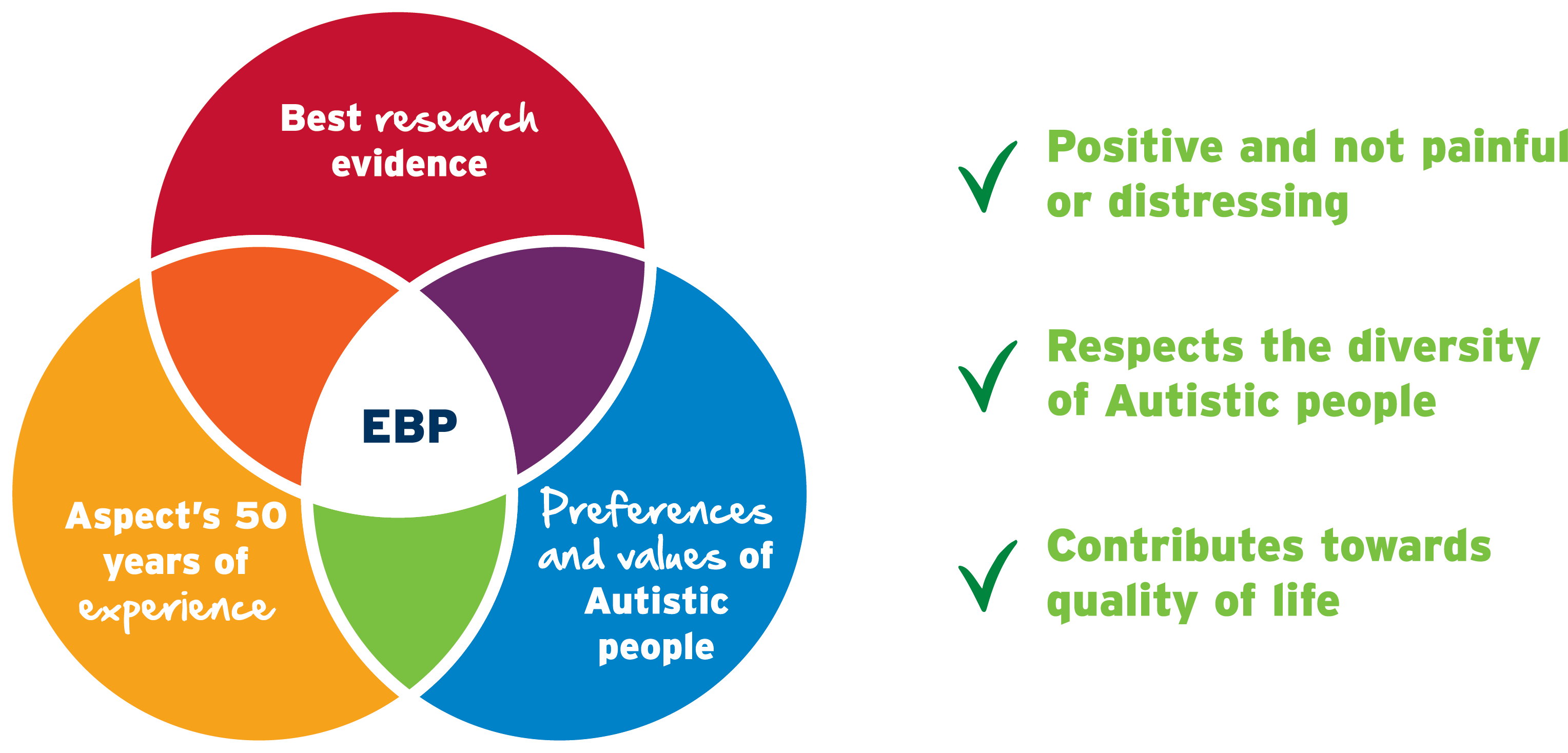What is evidence-based practice at Aspect?
Aspect incorporates evidence-based and evidence-informed practices in the Aspect Comprehensive Approach (ACA). Aspect defines 'Evidence-based practice' as strategies that:
- have the highest quality available research showing positive impacts for Autistic people and their families in real-world settings
- meet the aspirations, preferences and values of people on the autism spectrum
- fit with Aspect’s 50 years of expertise in autism practice and assists the work of our educators, therapists and support staff
- are positive and not painful or distressing, respect the full diversity of Autistic people and can contribute towards an Autistic person’s satisfaction with their quality of life and their inclusion in society
In accordance with ‘a different brilliant’®, Aspect increasingly prioritises research and strategies that are co-produced and build on an Autistic person’s strengths and interests

What is evidence-informed practice at Aspect?
Evidence-informed practice refers to emerging practices that have yet to develop a research base.
Sometimes, it takes time for new research evidence to emerge. Where there is limited research available and strategies meet Aspect’s evidence-based practice criteria, Aspect’s Research Centre for Autism Practice (ARCAP) conducts research in partnership with the Autistic community to investigate evidence-informed strategies. This might include the use of technology (iPads or telehealth), strategies to support emotional regulation or approaches to training (e.g. the police) to respond positively.
Why is evidence-based practice important?
There is a long history of Autistic people receiving ineffective or harmful ‘treatments’ that have no evidence base. Aspect’s definition ensures only positive and effective strategies that are respectful of Autistic people are incorporated into the ACA.
Some strategies can be experienced as aversive or used to prevent Autistic people from using coping strategies. These strategies can be considered ‘research-based’ (in that there is research that supports their use) but are not included in the ACA as they do not meet Aspect’s criteria for being an evidence-based practice.
ARCAP aims to increase high-quality research to inform evidence-based practice that results in positive outcomes for people on the autism spectrum.
Common Questions
Is Aspect’s definition of 'Evidence-Based Practice' the same as other definitions?
Aspect’s definition draws from the original definition of evidence-based medicine (Sackett et al, 1996) and is in line with the definition of evidence-based practice used by the Australian Psychological Society (APA) and Association for Positive Behaviour Support (APBS). Aspect’s definition is informed by our purpose ‘a different brilliant’® understanding, engaging and celebrating the strengths, interests and aspirations of people on the autism spectrum’.
What does ‘the highest quality available research’ mean?
The quality of research is often considered as a hierarchy based on the design and quality of the research. ‘Random control trials’ are considered the gold standard as they reduce the potential for bias. Many variables contribute to research quality including sample size, independent researchers, ‘blind’ researchers and participants, pre-registered studies, peer review, replicated studies, follow up etc Aspect supports and incorporates high-quality research into the ACA.
Aspect includes a range of other types of research to inform practice in the absence of RCTs, especially when there are new practices requiring research. This research includes peer-reviewed high-quality group and single studies replicated by different researchers.
What does Aspect consider a ‘positive impact’ for Autistic people?
Aspect’s research and practice aims to have a positive impact on the quality of life of Aspect students and participants. Quality of life includes a person’s satisfaction with their physical and mental health, self-worth learning and achievement, inclusion belonging and identity, relationships, leisure and recreation, independence, material wellbeing, enabling environments and a positive future outlook.